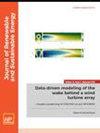潜在均方根误差技能得分
IF 1.9
4区 工程技术
Q4 ENERGY & FUELS
引用次数: 0
摘要
从狭义上讲,一致性是指预报优化策略与核查指令之间的一致性。目前推荐的确定性太阳预报验证做法是根据均方根误差(RMSE)报告技能得分,如果预报是根据其他策略(如最小化平均绝对误差(MAE))优化的,则会违反一致性概念。本文提出了一种所谓的 "潜在 RMSE 技能得分",它只取决于(1)预测与观测之间的交叉相关性和(2)观测的自相关性,从而克服了这一困难。虽然大大简化了计算,但新的技能分值对不一致预测的区分度并不高,例如,即使是 MAE 优化预测也能获得较高的 RMSE 技能分值。本文章由计算机程序翻译,如有差异,请以英文原文为准。
Potential root mean square error skill score
Consistency, in a narrow sense, denotes the alignment between the forecast-optimization strategy and the verification directive. The current recommended deterministic solar forecast verification practice is to report the skill score based on root mean square error (RMSE), which would violate the notion of consistency if the forecasts are optimized under another strategy such as minimizing the mean absolute error (MAE). This paper overcomes such difficulty by proposing a so-called “potential RMSE skill score,” which depends only on (1) the cross-correlation between forecasts and observations and (2) the autocorrelation of observations. While greatly simplifying the calculation, the new skill score does not discriminate inconsistent forecasts as much, e.g., even MAE-optimized forecasts can attain a high RMSE skill score.
求助全文
通过发布文献求助,成功后即可免费获取论文全文。
去求助
来源期刊

Journal of Renewable and Sustainable Energy
ENERGY & FUELS-ENERGY & FUELS
CiteScore
4.30
自引率
12.00%
发文量
122
审稿时长
4.2 months
期刊介绍:
The Journal of Renewable and Sustainable Energy (JRSE) is an interdisciplinary, peer-reviewed journal covering all areas of renewable and sustainable energy relevant to the physical science and engineering communities. The interdisciplinary approach of the publication ensures that the editors draw from researchers worldwide in a diverse range of fields.
Topics covered include:
Renewable energy economics and policy
Renewable energy resource assessment
Solar energy: photovoltaics, solar thermal energy, solar energy for fuels
Wind energy: wind farms, rotors and blades, on- and offshore wind conditions, aerodynamics, fluid dynamics
Bioenergy: biofuels, biomass conversion, artificial photosynthesis
Distributed energy generation: rooftop PV, distributed fuel cells, distributed wind, micro-hydrogen power generation
Power distribution & systems modeling: power electronics and controls, smart grid
Energy efficient buildings: smart windows, PV, wind, power management
Energy conversion: flexoelectric, piezoelectric, thermoelectric, other technologies
Energy storage: batteries, supercapacitors, hydrogen storage, other fuels
Fuel cells: proton exchange membrane cells, solid oxide cells, hybrid fuel cells, other
Marine and hydroelectric energy: dams, tides, waves, other
Transportation: alternative vehicle technologies, plug-in technologies, other
Geothermal energy
 求助内容:
求助内容: 应助结果提醒方式:
应助结果提醒方式:


